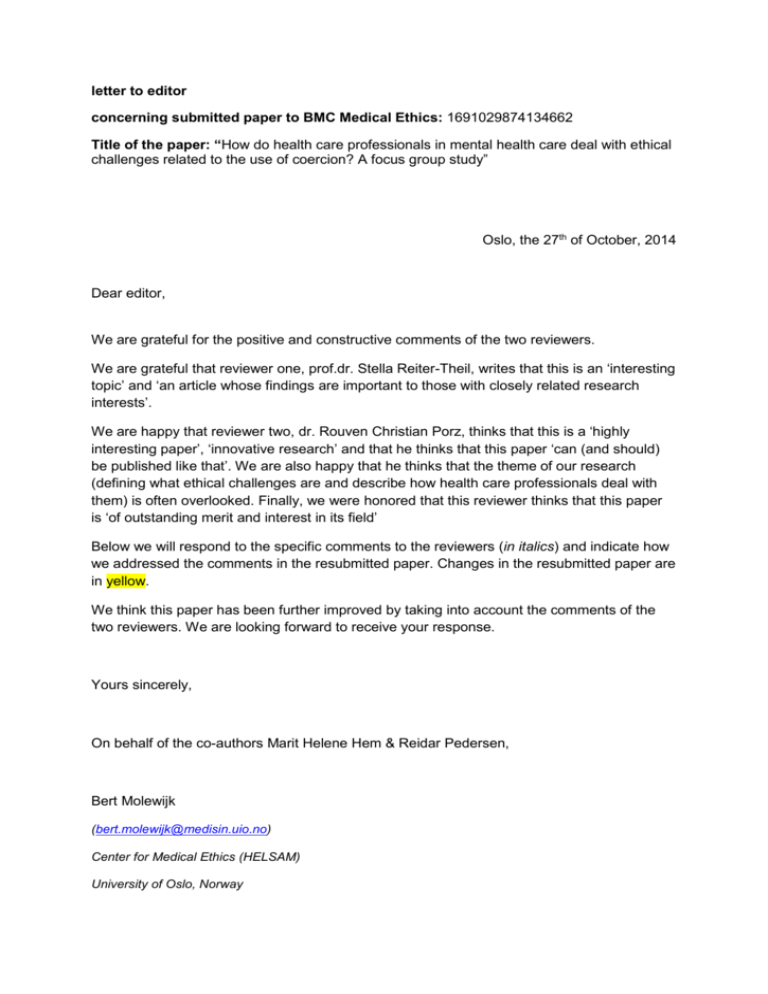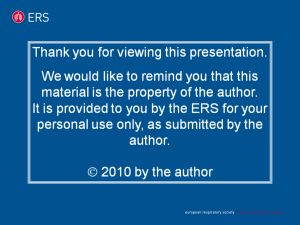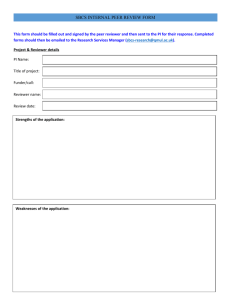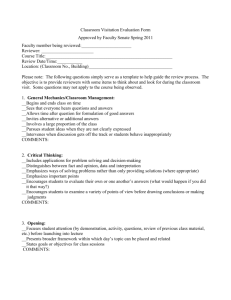Reviewer - BioMed Central
advertisement

letter to editor concerning submitted paper to BMC Medical Ethics: 1691029874134662 Title of the paper: “How do health care professionals in mental health care deal with ethical challenges related to the use of coercion? A focus group study” Oslo, the 27th of October, 2014 Dear editor, We are grateful for the positive and constructive comments of the two reviewers. We are grateful that reviewer one, prof.dr. Stella Reiter-Theil, writes that this is an ‘interesting topic’ and ‘an article whose findings are important to those with closely related research interests’. We are happy that reviewer two, dr. Rouven Christian Porz, thinks that this is a ‘highly interesting paper’, ‘innovative research’ and that he thinks that this paper ‘can (and should) be published like that’. We are also happy that he thinks that the theme of our research (defining what ethical challenges are and describe how health care professionals deal with them) is often overlooked. Finally, we were honored that this reviewer thinks that this paper is ‘of outstanding merit and interest in its field’ Below we will respond to the specific comments to the reviewers (in italics) and indicate how we addressed the comments in the resubmitted paper. Changes in the resubmitted paper are in yellow. We think this paper has been further improved by taking into account the comments of the two reviewers. We are looking forward to receive your response. Yours sincerely, On behalf of the co-authors Marit Helene Hem & Reidar Pedersen, Bert Molewijk (bert.molewijk@medisin.uio.no) Center for Medical Ethics (HELSAM) University of Oslo, Norway Reviewer(s)' Comments to Authors: Reviewer: Prof.dr. Stella Reiter-Theil (1825273621439235) 1. Please shorten redundant parts of text, esp. regarding quotes and descriptive text referring to these quotes (without giving additional information). We have reread the paper and have deleted some redundant parts of the texts thereby using blue marks. 2. Please formulate clear and explicit categories of what participants called "ethical challenges" - or understood by them. Otherwise, the empirical basis of this central topic remains too vague, esp. as it is emphasized how diverse the participants' answers were. We think this is an important and useful comment. Therefore we wrote an additional part in the seventh paragraph of the Discussion section (as from line 568) in order to formulate clear and explicit categories of what participants called ‘ethical challenges’. 3. In the discussion about what researchers (other authors) have called "ethical challenges, you should add references where triggers for requesting ethics support (ethics consultation) are articulated. For example, in > 'The Freiburg approach to ethics consultation: process, outcome and competencies' ReiterTheil 2001, Journal of Medical Ethics, you will find 4 basic categories that seem to be helpful; see p. 199, last paragraph. (This is the first mention of the categorization that has been developed / referred to in further papers.) We did an additional check for references from other authors related to ‘ethical challenges’ and inserted some extra references in the Discussion section (DuVal et al 2001JME; 42 & Reiter-Theil 2001JME; 43). 4. Please edit the language of the text. We edited the language of the text again, we clarified the present and past tense (see Reviewer Porz, point 1) and we asked for an additional language check for the whole paper by a native English speaker. 5. It is a merit to articulate weaknesses of a paper. However, the authors neutralize their self-criticism by calling the same aspect (weakness) a strength. The reviewer considers the decision of not offering a definition (understanding) of "ethical challenge" to the participants beforehand, rather a weakness than a strength; the study apparently did not work with the arising uncertainties or discrepancies of understanding in the sense that participants were interviewed towards further developing their concepts in order to increase clarity of consistency ... We recognize the reviewer’s consideration that not offering a definition (understanding) of ‘ethical challenges’ to the participants can be understood as a weakness, like we already wrote in the ‘limitations and strengths’ section. Still, we think that it was worthwhile to first explore how participants thought and talked about ethical challenges ‘naturally’, without a definition from our side. This resulted in a rich and varied harvest. We think this lacked in the literature so far, in particular related to the use of coercion in mental health care. We strongly agree with the reviewer that it is necessary and worthwhile to further develop the participants’ concepts in order to increase clarity and consistency. This was one of the aims of the larger study indeed. However, within this first part of that larger study we tried to focus on what the participants themselves presented (at the beginning of the implementation project). Later on in that implementation project, both when we as researchers gave our presentations on ethics and ethics reflection groups, and when we trained health care professionals as facilitators, we developed these concepts explicitly with these participants. We have clarified this point further in both the Methods section and the ‘limitations and strengths’ section. As the respondents were not very articulate about ethical content in the narrow sense, it is desirable that the authors instead give some more insight on how they reconstruct / reformulate the ETHICAL (in the strict sense) quality of the challenges. We agree with the reviewer that it is worthwhile and relevant to give more insight in how we as authors reconstruct and reformulated the ethical quality of the challenges. We therefore added our temporarily formulation of the categories which the participants described as ethical challenges in the last part of the Discussion section. Reviewer: Dr. Rouven Christian Porz (1020542341395203) 1. As discretionary revision, the authors might consider an additional language check. I sometimes got confused in the change of present/past tense, but these are just minor language issues. We edited the language of the text again, we clarified the present and past tense (see Reviewer Reiter-Theil, point 4) and we asked for an additional language check for the whole paper by a native English speaker.







